I am currently alternating working with three different horses.
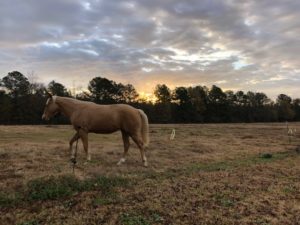
Pistol at sunrise
Pistol, our one-year-old filly, is trusting, inquisitive, and friendly. She is still several months away from being ready to ride, as her muscles, tendons, and joints are still developing. However, we are already working on lead line training and basic ground manners.
Pistol is fun to work with. She is super curious about everything, which is a wonderful trait in a horse and something I intend to encourage.
Pistol’s natural curiosity tends to be a little distracting. While we are working on paying close attention to backing or advancing step-by-step as cued, she is likely to turn off to sniff the pile of horse poop beside her. She is very young with a short attention span. So, I try to take that into account. If I ask for a right turn on the hind and she distractedly gives me four half-hearted vague steps then one pretty decent turn with her right forefoot reaching out a ways, I will immediately stop and praise her like she was the smartest filly in the whole world. At this stage, I’m not sure she even knows what she’s being praised for. However, with time and consistency, she will learn expected responses to different cues.
Pistol is a beginner who is still trying to figure out basic communication and simple expectations. Accordingly, I reward small tries and small improvements. It’s not about getting it right… it’s about beginning to understand.
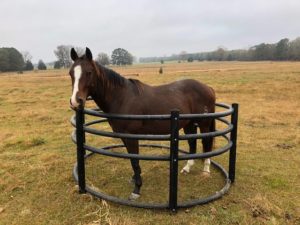
Archie managed to trap himself in the hay ring one morning
Archie, our five-year-old stallion, is coming along really well. Archie is a calm, friendly horse who doesn’t get very bothered by much. In general, Archie is pretty solid, but needs more riding. Sometimes, he is responsive and light. Other times, he can be fairly willful and sluggish.
Yesterday, I rode Archie around our pastures. The chilly, damp, windy January weather had him feeling a little forward and he was quick to spontaneously move up from a walk to a trot or from a trot to a lope. Because he was feeling so forward, he was also quick to misinterpret cues. I would give a leg cue for a step to the left and he would interpret it as an excuse to pick up to a lope.
Archie knows the cues and on a good day we communicate well. However, he needs work on consistency. In chilly weather or with distractions, he is likely to focus more on what he wants to do than on understanding what I’m asking for.
Accordingly, I have to keep things pretty black-and-white with Archie. Corrections need to be clear and decisive. With Archie, I can’t give a lot of latitude for doing things his own way. I have to be clear in my communication and I have to be particular in insisting on the correct response.
At the same time, I have to use good timing and be quick to remove pressure when Archie does what I ask. I try to help Archie feel a distinct difference between comfort going with what I ask versus discomfort resisting what I ask.
I am much more particular with Archie than with Pistol. Archie knows a lot more and I expect more of him. At this stage of Archie’s development, rules are enforced fairly rigidly. I do try to listen to Archie and consider his perspective. However, he is at a stage where it is pretty important for him to learn consistency in promptly responding to my cues regardless of the circumstances.
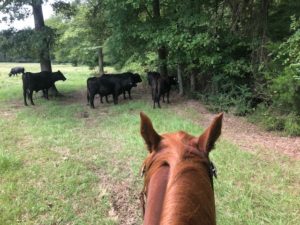
Most pictures of Knockout are from this view
Knockout, my nine-year-old gelding, is just a real pleasure to ride. He is a willing, solid horse, who is responsive and tries hard to please. I have been working with Knockout more than four years and we have a good relationship. Although we are still learning from each other, the communication tends to flow fairly easily.
As much as I enjoy working with Pistol and Archie, they are a lot of work requiring careful attention. With Knockout, I can just relax and enjoy the ride. Whether we are opening and closing gates, checking cows, repairing fence, or moving cows around, Knockout knows what is expected and is eager to please.
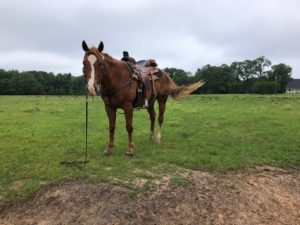
Knockout saddled and ground tied
With Knockout, I don’t have to be so rules oriented. I tend to point Knockout in the right direction then let him choose the exact path. When crossing a creek, if Knockout wants to move a few yards downstream to a place he feels more comfortable crossing, I let him choose. I don’t have to wonder if he’s trying to avoid the crossing. I know he’s just looking for good footing… which is his responsibility.
Going home, I usually just give Knockout his head and let him choose the path. He knows to keep it to a walk unless I cue otherwise, and he knows the way home. It’s sort of fun seeing which direction he’ll choose. Sometimes, he surprises me by choosing a round-about route. Other times, he’ll choose a shorter route even though it has more obstacles to cross. I view the homeward path with Knockout as a chance to let him share in the decision making without fear of reprimand for doing the wrong thing.
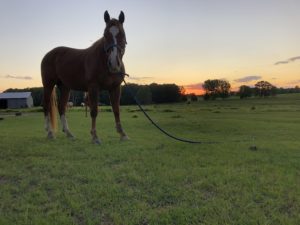 Riding Knockout doesn’t feel like training. It feels more like enjoying the company of a trusted partner while working together to get a job done.
Riding Knockout doesn’t feel like training. It feels more like enjoying the company of a trusted partner while working together to get a job done.
With each of these horses, my goal is relationship. I want a trusting partnership where we each are heard. I want the horse to be a willing partner, rather than coerced or forced.
Because these relationships are at different stages, rules play differing roles.
With Pistol, rules are mostly for the purpose of establishing a means of clear communication. While I strive for consistency in expectations, I’m also not super particular so long as she shows good effort.
With Archie, rules are fairly yet rigidly applied. On a good day, corrections are mild and rare. On a more distracted day, corrections are more frequent and more abrupt.
With Knockout, I don’t really think in terms of rules. We’re just communicating and working together. Correction, when required, is mostly just clarifying communication.
I think these three developmental stages can be seen in the Bible, in regard to our relationship with God.
In the Old Testament, before The Law, God was establishing communication and any attempt to do the right thing was rewarded.
After God gave the law to Moses, the relationship was much more rules oriented. The Law defined God’s expectations and God was more strict in enforcing the rules.
Through Christ, The Law has been fulfilled, and the New Covenant gives us a closer relationship with God, whereby we are indwelt and transformed by The Holy Spirit. In the New Covenant, as we pursue God’s heart and seek to please Him through the prompting of The Holy Spirit, rules cease to be so necessary.
This is the glorious message of the New Testament gospel! What God desires is relationship with us. The Law was never a goal unto itself… it was just a means to an end… a step toward establishing communication and revealing God’s character to us… so we could be restored to intimate relationship with God.
Throughout his letter to the Romans, the Apostle Paul repeatedly discusses the differences in relationship with God before The Law, under The Law, and through Christ:
For all who have sinned without the Law will also perish without the Law, and all who have sinned under the Law will be judged by the Law; for it is not the hearers of the Law who are righteous before God, but the doers of the Law who will be justified. For when Gentiles who do not have the Law instinctively perform the requirements of the Law, these, though not having the Law, are a law to themselves, in that they show the work of the Law written in their hearts, their conscience testifying and their thoughts alternately accusing or else defending them, on the day when, according to my gospel, God will judge the secrets of mankind through Christ Jesus. (Romans 2:12-16)
Now we know that whatever the Law says, it speaks to those who are under the Law, so that every mouth may be closed and all the world may become accountable to God; because by the works of the Law none of mankind will be justified in His sight; for through the Law comes knowledge of sin. (Romans 3:19-20)
But now apart from the Law the righteousness of God has been revealed, being witnessed by the Law and the Prophets, but it is the righteousness of God through faith in Jesus Christ for all those who believe; for there is no distinction, for all have sinned and fall short of the glory of God, being justified as a gift by His grace through the redemption which is in Christ Jesus, whom God displayed publicly as a propitiation in His blood through faith. (Romans 3:21-25)
Therefore, just as through one man sin entered into the world, and death through sin, and so death spread to all mankind, because all sinned— for until the Law sin was in the world, but sin is not counted against anyone when there is no law. Nevertheless, death reigned from Adam until Moses, even over those who had not sinned in the likeness of the violation committed by Adam, who is a type of Him who was to come. (Romans 5:12-14)
The Law came in so that the offense would increase; but where sin increased, grace abounded all the more, so that, as sin reigned in death, so also grace would reign through righteousness to eternal life through Jesus Christ our Lord. (Romans 5:20-21)
Paul continued this same theme through several of his other letters:
But before faith came, we were kept under the law, shut up unto the faith which should afterwards be revealed. Wherefore the law was our schoolmaster to bring us unto Christ, that we might be justified by faith. But after that faith is come, we are no longer under a schoolmaster. For ye are all the children of God by faith in Christ Jesus. (Galatians 3:23-25 KJV)
The Apostle Paul was a wonderful expositor on this topic. My favorite, though, is the succinct words of Jesus Christ to the twelve disciples:
I no longer call you servants, because a servant does not know his master’s business. Instead, I have called you friends, for everything that I learned from my Father I have made known to you. (John 15:15 NIV)
Friends! What wonderful relationship!
Your thoughts?

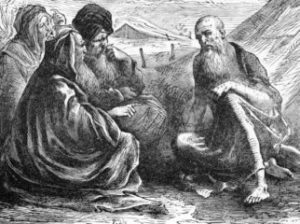 The book of Job is an amazing story of faith maturing through overwhelming trials. One of the difficulties we have with this story is the lack of definitive answers. We instinctively want to know, what did Job do to cause such tremendous catastrophe in his life?
The book of Job is an amazing story of faith maturing through overwhelming trials. One of the difficulties we have with this story is the lack of definitive answers. We instinctively want to know, what did Job do to cause such tremendous catastrophe in his life?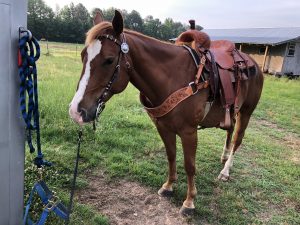 Saturday morning, Knockout and I started out on a relaxing pasture ride.
Saturday morning, Knockout and I started out on a relaxing pasture ride.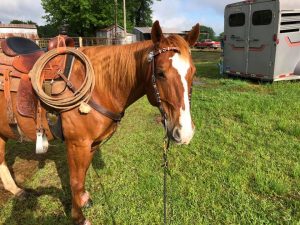
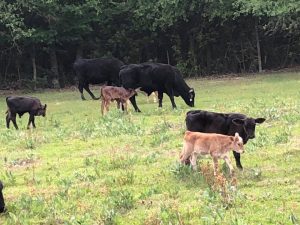 As we headed out of the arena toward the back pasture, Knockout walked toward the path we usually take. However, the cattle herd was on the east side of the pasture and I wanted to check on the young calves. So, I gently asked Knockout to head that direction. He promptly turned where I asked…then just as promptly started swinging back toward the familiar route. So, I repeated the soft cue. Again he promptly responded then started swinging back to familiar paths.
As we headed out of the arena toward the back pasture, Knockout walked toward the path we usually take. However, the cattle herd was on the east side of the pasture and I wanted to check on the young calves. So, I gently asked Knockout to head that direction. He promptly turned where I asked…then just as promptly started swinging back toward the familiar route. So, I repeated the soft cue. Again he promptly responded then started swinging back to familiar paths. The young calves and the mama cows all looked healthy. I pulled out my cell phone and snapped a few pictures before we continued on. As we left the herd, Knockout again picked up into a nice smooth trot which we continued all the way around the back of the pasture until I slowed him to a walk as we entered the woods.
The young calves and the mama cows all looked healthy. I pulled out my cell phone and snapped a few pictures before we continued on. As we left the herd, Knockout again picked up into a nice smooth trot which we continued all the way around the back of the pasture until I slowed him to a walk as we entered the woods.